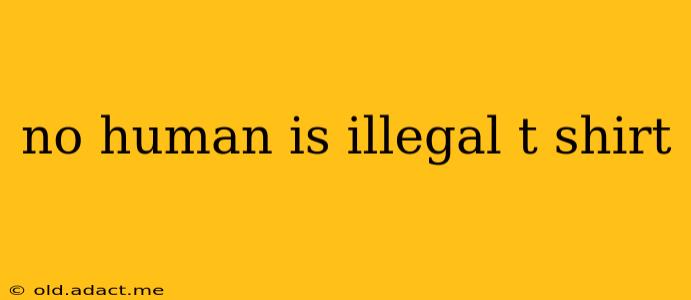The phrase "No Human Is Illegal" has become a powerful slogan in the fight for migrant rights and against xenophobia. It's a statement that challenges the very foundation of immigration laws that categorize people based on their legal status. But what does it really mean, and what are the complexities behind this seemingly simple declaration? This article delves into the meaning, the impact, and the ongoing debate surrounding this powerful statement.
What Does "No Human Is Illegal" Mean?
At its core, "No Human Is Illegal" asserts the inherent human dignity and worth of every individual, regardless of their immigration status. It challenges the dehumanizing effects of legal frameworks that label people as "illegal" or "undocumented." This labeling strips individuals of their identity and reduces them to a legal status, ignoring their contributions to society, their personal stories, and their inherent right to live with safety and dignity. The statement argues that while immigration laws and regulations exist, these laws should not define a person's humanity or their fundamental rights.
Is "No Human Is Illegal" a Political Statement?
Yes, unequivocally. The phrase is a politically charged statement that directly confronts existing immigration policies and systems. It's a call for reform, challenging the often harsh and inhumane treatment of migrants and refugees. It advocates for a more humane and just approach to immigration, prioritizing human rights over restrictive legal frameworks. The statement is frequently used in protests, demonstrations, and activist campaigns to raise awareness about the struggles faced by migrants and to advocate for policy changes.
What Are the Arguments Against the Statement "No Human Is Illegal"?
While the sentiment behind "No Human Is Illegal" resonates with many, some argue against it, citing concerns about the rule of law and national security. Critics argue that ignoring immigration laws undermines the legal system and could lead to chaos. They emphasize the importance of maintaining controlled borders and adhering to established legal procedures for immigration. However, counterarguments frequently highlight that the current immigration systems in many countries are often unjust, discriminatory, and designed in ways that exacerbate inequalities.
What Are the Different Perspectives on Immigration Laws?
The debate around immigration often boils down to differing perspectives on the role of the state in regulating movement across borders and the balance between national interests and humanitarian concerns. Some argue for stricter border controls and enforcement of existing laws, emphasizing national security and the protection of resources. Others advocate for more compassionate and inclusive immigration policies, emphasizing the human rights of migrants and the economic benefits of immigration. The "No Human Is Illegal" statement firmly aligns itself with the latter perspective.
How Does the Phrase Impact the Fight for Migrant Rights?
The "No Human Is Illegal" statement serves as a powerful rallying cry for migrant rights activists. It provides a concise and emotionally resonant message that helps to frame the debate in terms of human dignity and justice. By reframing the discussion, the slogan challenges the dehumanizing language often used to describe migrants and helps foster empathy and understanding among a wider audience. It is a significant component in the movement to create more equitable and humane immigration systems worldwide.
Conclusion: A Call for Empathy and Justice
The "No Human Is Illegal" statement is more than just a slogan; it's a call for a fundamental shift in how we perceive and treat migrants and refugees. It's a challenge to confront the injustices within immigration systems and to advocate for policies that uphold human rights and dignity. The ongoing debate surrounding the statement reflects the complexity of immigration issues and underscores the need for a more compassionate and just approach to this global challenge. The statement’s impact rests on its ability to inspire empathy and foster a global conversation about the treatment of migrants and the importance of upholding human rights for everyone.
